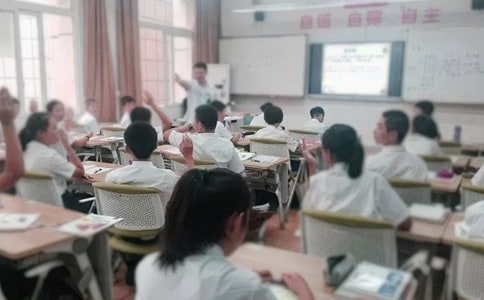- 相關推薦
Lesson 82 多媒體教學設計方案
Lesson 82 多媒體教學設計方案

Teaching Aims
1. Study this lesson and know the way how learn foreign languages Karl Marx.
2. The students are trained to improve their reading ability and comprehension.
Teaching Procedures
Step 1Show the pictures
教師活動:教師展示圖片(見圖片ppt.)
學生活動:學生看完圖片后,回答教師問題:
What do you already know about Karl Marx?
Step 2 Watch the video
教師活動:教師播放視頻(見ppt.),提問下列問題。
學生活動:看完視頻后,回答課文相關問題:
After watching, do some True or False questions
1) Karl Marx was born in Belgium. (F)
2) He was forced to leave his homeland when he was young. (T)
3) Marx made such rapid progress in English that Engels telephoned him and praised him for it. (F)
4) Marx was good at learning foreign languages. (T)
5) In one of his books, Marx gave some advice on how to learn English. (,F)
Step 3 Listening and Answering
教師活動:教師播放課文聲音(見ppt.),提問下列問題。
學生活動:學生聽完錄音后,回答下列問題:
1.What was Marx’s native language?
2.Where did he stay before he went to France? Why did he leave Germany?
3.What did he do with his English later on?
4.When did Marx start learning Russian? Why?
5.How long did it take him to learn Russian well enough to read articles?
6.What advice did Marx give on how to learn a foreign language?
Suggest answers:
1.German was his native language.
2.He stayed in Belgium, for political reasons.
3.He began to study Russian.
4.He’s already fifties, he found it important to study the situation in Russia.
5.At the end of six months he had learned enough to read articles and reports in Russian.
6.should not translate everything into their own language, master then use it, learn the spirit of the foreign language .
Step 4 Listening Again
教師活動:教師播放課文的段落聲音(見ppt.),提問學生每段含意。
學生活動:學生聽課文的段落聲音,回答段落含意。
P1:Some of his revolutionary activities in his early years.
P2—P5: How Marx learned foreign languages.
P6:Marx’s advice on how to learn a foreign language.
Step5 Reading
教師活動:教師給學生五到十分鐘的閱讀時間,提問學生下列各題。
學生活動:學生在閱讀之后,回答下列問題
Read the passages in Lesson 82,Write notes in the spaces below:
Name :Karl Marx Born:___________
as a young man :_____________________________________________________________
wrote books :_________________________
in 1849 :__________________________________________________________________
later:______________________________________________________________________
in 1853 :______________________________________________________________________
later :__________________________________
in the 1870s :____________________________
Key: was born in Germany; was forced to leave his homeland for political reasons; went to Belgium and France.; The Civil War in France; went to England; made London the base for his revolutionary work; started working hard to improve his English; made rapid progress; wrote articles in English; was praised; was encouraged; was not sure about two things; kept on studying and using English; began to learn Russian; read articles and reports in Russian
Step 6 Exercise
學生活動:
Karl Marx was born in ______. When he was young, he was _____ to leave his homeland for _____ reasons. He had to _____ from one country to another. At last he came to England and _____ London the base for his ______ work. Marx had learned some _____ before he came to London, but he found his English was _____. He _____ working hard to _____ it. He made _____ rapid progress _____ before long he could write articles in English. Engels wrote him a letter to _______him for it. Engels’ letter had greatly _________ him, and from then on, Marx ________ even harder at his English. He _______ English so well that he could write one of his great ______, The Civil War in France in English. When Marx was in his ______, he began to learn _______, because he thought it was important to study the _______ in Russia. At the _____ of six months, he had learned ______ to read articles and reports in Russian. Marx set us a good example in learning _____ languages.
Step 7 Discussion
教師活動:教師組織學生,回答下面的討論問題,教師給學生五到十分鐘的時間,然后提問。
What can we learn from Karl Marx in learning foreign languages? How can we learn English well?
學生活動:學生討論如下問題,并且回答:
1.Keep on studying and using ------ master it well.
2.Make clear the purpose of learning English.
3.Train a good habit and grasp a good method of studying
a spirit of perseverance: try hard continuously in spite of difficulties
Step 8 Role-play
教師活動:
Suppose the great man Marx (VIP) came here. Now you ask him about his life experience and how he learned foreign languages and he’d like to answer your questions.
學生活動:
•Possible Model:
•S: Glad to meet you, Mr. Marx. Can I ask you some questions?
•M: Go ahead please.
•S: When and where were you born?
•M:…
•S: Why did you leave your homeland?
•M:…
... ... …
•S: Can you give some advice on how to learn...?
•M:…
•S: Thank you very much.
•M: My pleasure.
Step 9 Homework
1. Preparation the Lesson 83.
2.Retell the text with your own words.
Step 10 Introduction
教師活動:教師展示馬克思的相關圖片(見ppt.)及文字
Karl Marx was born in Germany in 1818. He was a great revolutionary leader. He led the worker’s movement in the 19th century. Together with his friend Engels, in 1848, Mark wrote a book Communist Manifesto, which set a programme for socialist revolution. In 1849 he went to live in England and made London the base for his revolutionary work. In 1864 he founded the first International in London and three years. Later he published his famous book Das Kapital(德語《資本論》), which developed his theories about capitalism Marx died in 1883. He devoted all his life to the revolutionary cause. He will always be remembered by every one of us
【Lesson 82 多媒體教學設計方案】相關文章:
Lesson 82 教學設計方案08-17
Lesson 93 and Lesson 95 多媒體教學設計方案08-17
Lesson 96 多媒體教學設計方案08-17
Lesson 91 多媒體教學設計方案08-17
Lesson 83 多媒體教學設計方案08-17
Lesson 98 多媒體教學設計方案08-17
Lesson 90 多媒體教學設計方案08-17
Lesson 87多媒體教學設計方案08-17
Lesson 78 多媒體教學設計方案08-17